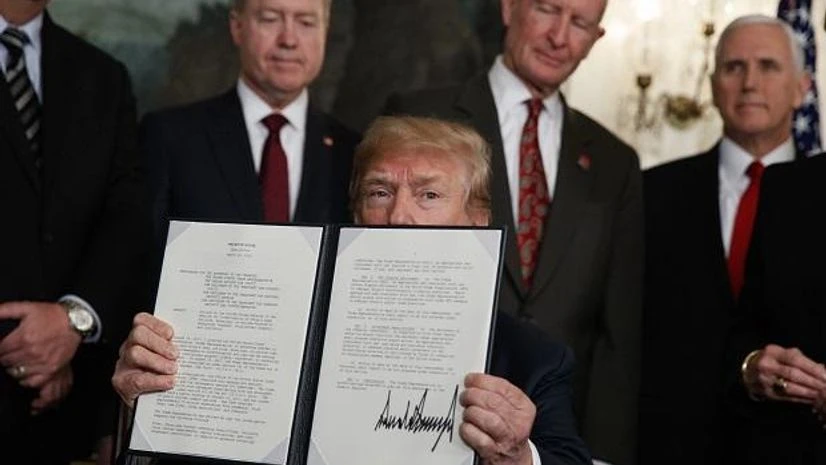
The most recent development in the trade war between the United States and India comes with Kevin Hassett, who formerly was the top economic adviser to Donald Trump, calling India’s tariffs “extraordinarily high”. Trump, who says India has been “a big trade abuser” for too long, has continued to demand reciprocal tariffs. He recently imposed a 25% duty on steel and aluminium as part of a complex trade agenda that would impact significant trading partners, including South Korea, Canada, Mexico, and Brazil.
India is considering lowering tariffs in some industries, such as electronics and medical products, to increase US exports. This is perceived as a response to growing pressures from Washington and an attempt to cement economic relations before Prime Minister Modi visited the US.
According to many critics, including international organizations and trading partners, the Trump administration’s similar protectionist trade policies legislated a new hike in tariff rates, which drew threats of retaliation from the European Union (EU).
Trump’s Stance on Trade and Tariffs
Trump’s Argument for Reciprocal Tariffs
Donald Trump has long considered the mechanism of ‘reciprocal tariffs’ to exist, essentially clashing with tariffs imposed by any other nation on the US. He has previously targeted India for its high import duties on motorcycles, medical devices, and technology products.
During his presidency, Trump repeatedly attacked India’s trade policies, describing it as a “tariff king” and arguing that India restricts the US while benefiting from US access to the US.
He brazened for this position when he remarked recently: “If they charge us, we charge them. The days of the United States being taken advantage of by other nations are over.”
)
Key Tariff Announcements
On Sunday, Trump announced that his administration would impose a 25% tariff on all foreign steel and aluminium imports, including from the US, like Canada, Mexico, and the EU. Additionally, Trump has hinted at further tariffs on Chinese goods and sectors such as:
- Pharmaceuticals
- Semiconductors
- Consumer electronics
- Industrial machinery
His America First economic policies aim to protect domestic industries but have also triggered trade wars with multiple nations.
India’s Tariffs Under Scrutiny
Why Are India’s Tariffs Considered High?
India has historically imposed high import tariffs to protect its domestic industries and promote local manufacturing. Some of the highest tariffs in India include:
- Automobiles: Import duties on luxury cars can be as high as 100%
- Medical Devices: Certain medical products face tariffs of up to 42%
- Smartphones and Electronics: Some electronic goods face import duties of up to 20%
- Dairy Products: India imposes a 60% tariff on dairy imports to support its domestic dairy industry
These tariffs have become a central sticking point in the trade talks between the US-India.
India’s Plan to Cut Tariffs
India is thinking of lowering tariffs in a few areas in reaction to the escalating trade tensions, including:
- Electronics (to facilitate US teleports)
- Medical Equipment (to lower healthcare costs)
- Industrial Goods
In the trade negotiations between the US-India, tariffs have emerged as a significant disagreement.
International Reactions to Trump’s Tariffs
European Union’s Strong Opposition
Trump’s 25% tariff on steel and aluminium has been called “unlawful and unjustified” by the European Union. In retaliation, the EU has warned of imposing counter-tariffs on the United States, primarily targeting:
- American whiskey
- Motorcycles (like Harley-Davidson)
- Agricultural products
A European Commission spokesperson stated: “The U.S. unilateral tariffs are against the rules of international trade and will be answered robustly.”
Impact on the U.S. Stock Market
Surprisingly, the US, despite Trump’s tariff announcement. Major indexes saw gains on Monday, with:
- Dow Jones Industrial Average: +287 points (+0.7%)
- S&P 500: +0.6%
- Nasdaq Composite: +0.7%
Investors appeared to brush off concerns about trade wars and instead focused on key economic reports expected later in the week.
Potential Consequences of Trump’s Tariff Policies
Impact on US Business
Many US companies rely on imported raw materials, especially in the automobile, construction, and manufacturing industries. The 25% tariff on steel and aluminium could lead to:
- Increased production costs for American companies
- Higher prices for consumers
- Possible job losses in sectors affected by retaliatory tariffs
Effect on India-U.S. Trade Relations
While India and the US are strategic allies, trade tensions could strain relations, mainly if reciprocal tariffs are enforced. Possible impacts include:
- Higher import costs for Indian businesses that rely on US potential trade restrictions on Indian exports to the US.
- Sundown in bilateral trade agreements
Retaliatory Measures by India
If the US raises tariffs on its exports, India has several retaliatory options:

- Increased tariffs on US agricultural exports
- Stricter regulations on US companies operating in India
- Delayed approvals for American businesses expanding in India
Conclusion: US-India Trade War
The new precedent for a US-India trade war is only going to complicate the global trade policy landscape. While Trump’s detractors are certainly going to have fun watching him explain away retaliatory tariffs, the policy will endanger key trade relationships and encourage retaliations.
India may use lowering tariffs in a few industries as a diplomatic tactic to reduce hostilities and improve trade relations with the United States. But if Trump’s tariffs keep getting worse, it may endanger trade relations between the US-India and affect companies.
How the EU, India, and other impacted countries will react to Trump’s harsh tariff measures as the world trade environment changes is unclear. There is no winner in trade battles; only supply networks are disrupted, and the economy is left unsettled.




